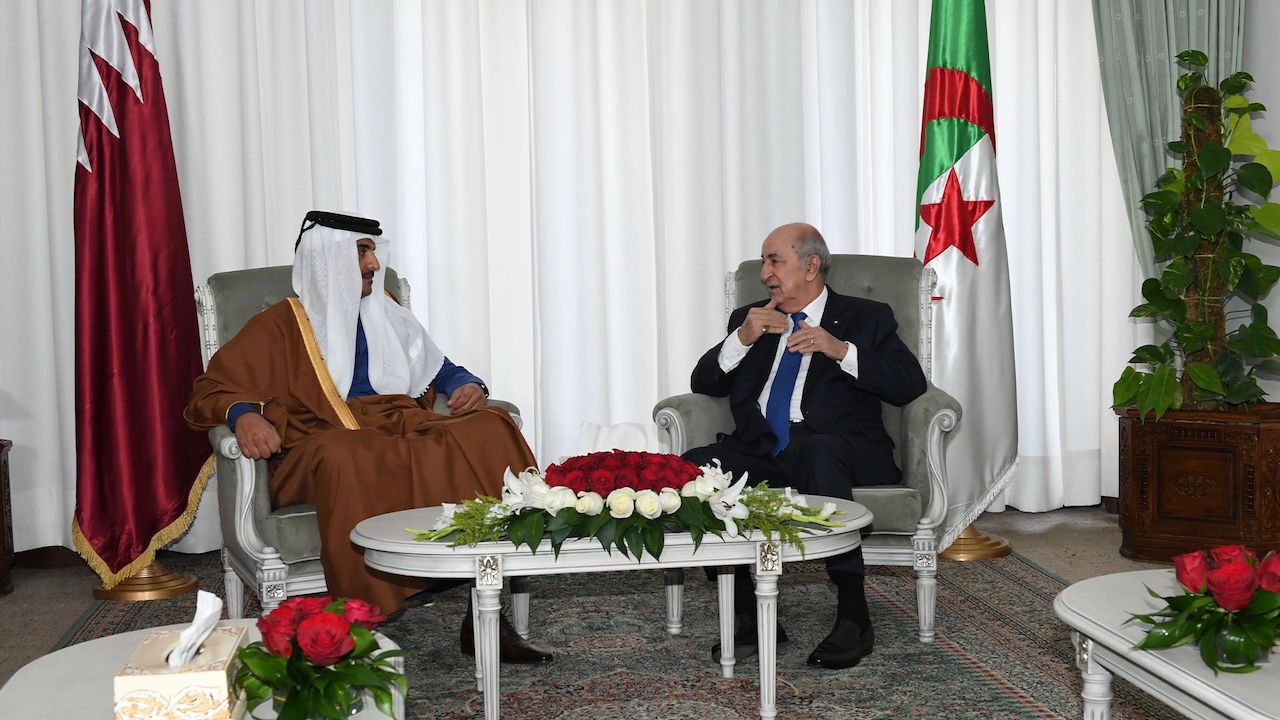Whilst seeing significant growth in their economic ties, Doha and Algiers do not agree on Syria as much as they do on Libya.
At the invitation Qatar’s Sheikh Tamim bin Hamad Al-Thani, Algerian President Abdelmadjid Tebboune begins a two day visit to the Gulf state as of 19 February, to promote strong bilateral cooperation, discuss regional politics, and attend the 6th Summit of the Heads of State and Government of the Gas Exporting Countries Forum (GECF).
Qatari-Algerian relations have been amicably advantageous over the past decade. Focused on the expansion and solidification of bilateral relations, both states have consistently pursued means of economic, political, and diplomatic cooperation. The increased regional Arab and international conflicts during this decade have prompted both states, who share “identical views” on many issues, to further develop means of extensive coordination.
Since president Tebboune’s election into office in 2019, Sheikh Tamim has both visited Algeria and received an Algerian diplomatic delegation in Doha. The meetings typically explore common areas of collaboration and partnership. In the latest meeting between the two, Qatar affirmed its hopes to “advance the bilateral strategic partnership between the two countries and serve the common causes and interests of the Arab nation.”
Read more: Algerian President meets Qatar’s Amir ahead of gas exporting forum
Economic Trade
Economic cooperation has been a major aspect in the strengthening of ties between the two countries. Last November, the Algerian Ambassador to Qatar Mustafa Boutoura hosted a Qatari envoy at the embassy in an official reception celebrating the 67th anniversary of Algeria’s Revolution. Successful economic cooperation was specifically highlighted as discussions of diversified investment plans and wide-range developments of the economies progressed.
Qatar has invested over $2 billion in the joint establishment of the Algerian Qatari Steel (AQS) company in the North African country, since 2013. AQS has since played an important role in the national and regional steel industry, producing at a capacity of 400 million tons of steel. In addition to Qatari Ooredoo’s success in the Algerian telecommunications sector, Qatar has also invested in agriculture, tourism, real estate, finance, and other industries in the country.
In Qatar, there were an estimated 115 Qatari-Algerian joint businesses functioning in 2018, with the population of the Algerian workforce steadily growing in various sectors of the Qatari economy. Whilst the Qatari envoy assured their intention “to sign agreements that truly express the aspirations of both sides in the field of bilateral cooperation,” Boutoura also emphasised the embassy’s priority to double joint investments between both countries.
Energy Relations
As major gas producers and active members of the Organization of Arab Petroleum Exporting Countries (OAPEC) and the Gas Exporting Countries Forum (GECF), Qatar and Algeria’s relations have been widely shaped by their energy interests.
Considering the shifts in the global energy landscape over time and the increased influence of global competitors such as Russia and Iran, creating and maintaining energy alliances has been vital to secure the energy interests of countries.
For Qatar, Algeria presents itself as a fellow gas-producing state and a reliably strategic regional actor with a promising economy and relative Arab political stability. In 2013, both states signed a cooperation agreement for oil and gas, alongside seven other partnership accords in the sectors of energy, industry, and mining, and have continued to work closely since.
Regional Political Implications
In Libya, Qatar and Algeria have seen eye to eye when dealing with the ongoing internal strife.
By supporting the UN-recognised Libyan Government of National Accord (GNA) against UAE and Russian backed Libyan warlord Khalifa Haftar and his insurgent campaign, both Qatar and Algeria were able to play effective roles in mediating between multiple foreign parties, securing and stabilising the nation, and bringing about a political transition that reflects the will of the Libyan population whilst maintaining national territorial integrity and sovereignty.
With the fear of conflict spillover minimised, Algeria has now been able to focus on promoting economic partnership with its recovering neighbour, as it established the Algerian-Libyan Economic Forum in May 2021 to facilitate business and trade cooperation between both nations.
Both Qatar and Algeria have been consistent in their dedication to support the unity, stability, and empowerment of Libya.
In the case of Syria however, the two states have not completely agreed on their approaches to the long-lasting conflict.
Since the early years of the war in Syria, Qatar has maintained a principled policy of supporting the local opposition calling for freedom and justice and has supported the suspension of Syria from the Arab League. Algeria, on the other hand, was one of the few Arab countries that objected to the alienation of Syria and to any external interference in its “domestic affairs”.
Recently, Algeria has enthusiastically called for the return of Syria to the Arab League and its attendance at the Arab Summit in March 2022. In response, Qatar reaffirmed its explicit refusal to normalise ties with the Assad Regime and its opposition to Syria’s return to the League.
With the upcoming Arab Summit hosted by Algeria this year, many await to observe the possible developments on momentous Arab dilemmas.
Mahjoob Zweiri is the director of the Gulf Studies Center, Qatar University. He can be found on @mzweiri.
Leen Al-Rabbat is a research assistant at the Gulf Studies Center, Qatar University.
Follow Doha News on Twitter, Instagram, Facebook and Youtube







